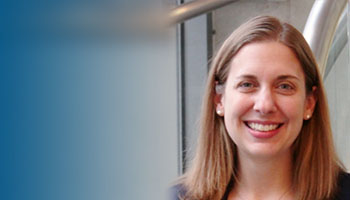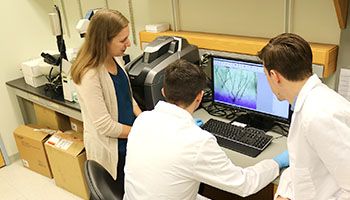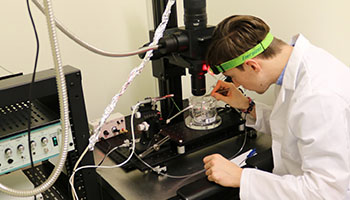HOW CAN WE HELP YOU? Call 1-800-TRY-CHOP
In This Section
Faculty Spotlight: ‘Bench to Bedside and Back’ With Rebecca Ahrens-Nicklas, MD, PhD

Our May featured Faculty Spotlight, Rebecca Ahrens-Nicklas, MD, PhD, studies why patients with inherited biochemical disorders often experience untreatable neurologic and cardiac symptoms.
Editor’s Note: This Q&A is the fifth in a series of monthly Cornerstone stories, in which we sit down with faculty members at Children’s Hospital of Philadelphia Research Institute to learn more about their research and roles. Through these spotlights, our readers have the opportunity to meet the diverse, dedicated, and distinctive individuals who lead our research community in our mission to improve children’s health. In this Q&A, we feature Rebecca Ahrens-Nicklas, MD, PhD, assistant professor of Pediatrics. At May’s virtual Faculty Luncheon, Dr. Ahrens-Nicklas will present a session titled “Metabolic Disorders of the Brain: Insights into Mechanisms and Therapy.” Stay tuned for more from our Faculty Spotlight series throughout this year!
Tell us how long have you been at CHOP, and what is your research specialty?
I’ve been here for 10 years. I came initially for my combined Pediatrics and Clinical Genetics residency and stayed for my fellowship and postdoctoral training before joining the faculty in 2019.
My research group works to develop better therapies for patients with rare inherited disorders of biochemical pathways, also called inborn errors of metabolism (IEM). In my clinical work, I am privileged to care for so many patients with these rare and ultra-rare disorders. Unfortunately, most of these diseases lead to permanent, progressive neurologic symptoms that are not corrected by currently available therapies.
For many IEM, we can improve biochemical abnormalities in patients’ blood using special diets or medications, but this does not usually translate to improvement in neuropsychiatric symptoms. Therefore, using genetic, biochemical, and electrophysiologic techniques in cells, model organisms, and human subjects, we are trying to uncover the mechanisms that drive neurologic dysfunction in patients with IEM. Building on these discoveries, we are developing new therapeutic strategies for IEM, including small-molecule, network-directed, and gene therapies.
In addition to our studies of known neurometabolic disorders, we have an active translational research program aimed at identifying and characterizing new genetic disorders. These discoveries often shed light onto pathologic mechanisms that are shared with more common disorders.

Why did you choose to focus on that specialty, and what are the long-term research questions you hope to answer?
As a clinician, I am motivated by the huge unmet need for better therapies for rare genetic diseases. As a scientist, I appreciate that each rare disease patient provides a unique opportunity to explore fundamental biologic questions. I really enjoy being able to move from bedside to bench and back, as we work to improve outcomes for our patients.
We hope to understand how biochemical pathways modulate brain function and to use this knowledge to develop better therapies for patients with inherited biochemical defects.
What is a current or recent research project that you are excited about?
We have several exciting ongoing projects in the lab. We have a longstanding interest in lysosomal storage disorders, including the neuronal ceroid lipofuscinoses and mucopolysaccharidoses. Gene therapy is actively being developed for several of these storage disorders. Unfortunately, if this treatment is given once neurologic symptoms begin, outcomes are usually very poor. We think this is because even if you correct the molecular defect, abnormal neuronal networks have formed during the early stages of the disease. Using biochemical and electrophysiologic techniques working with animal models, we are trying to identify the mechanisms underlying circuit-level defects in lysosomal storage disorders, and we aim to develop new therapies to correct these differences.
We recently expanded our focus to include more disorders of intermediary metabolism, specifically disorders of branched chain amino acid metabolism. These molecules are essential for several brain functions including energy metabolism, neurotransmitter synthesis, and development. Much like lysosomal storage diseases, even if you correct the biochemical defect in blood, patients have very poor neuropsychiatric outcomes. We are trying to understand what leads to neurologic dysfunction, in order to develop better approaches to therapy.

Can you share any words of advice to young scientists or students who aspire to become physician-scientists like yourself?
Find something you are passionate about, and then throw yourself into the work. If you are excited and committed to your science, you can make it through the difficult times and setbacks. Also, build a community of colleagues who share your enthusiasm and love for science. This network will make your career much more enjoyable and meaningful.
Learn more about Dr. Ahrens-Nicklas’ research at May’s Faculty Luncheon, May 13.